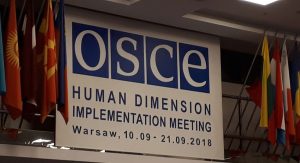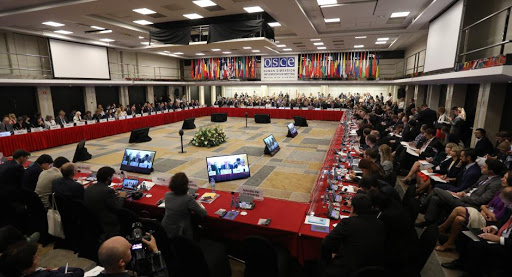OSCE 2018 : Working session 7: Fundarnental freedoms I, including freedom of thought, conscience, religion or belief
RELIGIOUS DISCRIMINATION AND STATE NEUTRALITY: THE CASE OF HUNGARY
 Alike other Eastern Europe countries, Hungary has adopted liberal legislation in the aftermath of the fall of Communism to consecrate freedom of religion and belief. However, subsequent political developments aimed at restoring Hungarian religious “heritage” and repressing nontraditional religious denominations. The 1990 liberal Law guaranteeing the right of freedom of conscience and religion for all and prohibiting discrimination has been replaced in 2011 by a new religion law that stripped approximately 200 religious communities of legal personality and established a two-tier system where the status of Churches is politically approved and non-recognized religious organizations are second-zone groups of parishioners deprived of the legal protection afforded to Churches.
Alike other Eastern Europe countries, Hungary has adopted liberal legislation in the aftermath of the fall of Communism to consecrate freedom of religion and belief. However, subsequent political developments aimed at restoring Hungarian religious “heritage” and repressing nontraditional religious denominations. The 1990 liberal Law guaranteeing the right of freedom of conscience and religion for all and prohibiting discrimination has been replaced in 2011 by a new religion law that stripped approximately 200 religious communities of legal personality and established a two-tier system where the status of Churches is politically approved and non-recognized religious organizations are second-zone groups of parishioners deprived of the legal protection afforded to Churches.
In 2011, the new Religion Law de-registered all but 14 of the more than 350 previously-registered religious groups. Apart from the recognized Churches listed in the Appendix to the 2011 Church Act, all other religious communities previously registered as Churches lost their status as Churches but could continue their activities as associations. If intending to continue as Churches, religious communities were required to apply to Parliament for individual recognition as such.
To “re-register” and gain legal status as “Churches” again, these de-registered groups had to win a two-thirds majority vote of the Hungarian Parliament, which politicized the process, violated the duty of the state to be neutral in religious matters, and engaged in discrimination against minority denominations.
By February 2012, the Parliament had denied the re-registration applications of 66 of the 84 previously-registered Churches that applied, without providing a substantive explanation for their denials. Among those lawfully registered Churches that were denied re-registration were Christian Churches, Evangelical Churches, Pentecostal Churches, the Church of Scientology and Buddhist, Hindu and Jewish groups. Many of these Churches were found to fulfill all of the conditions of the Religion Law, but they were rejected anyway.
Denial of registration as Churches also deprived these religious groups of their financial means of existence since it deprived them of their right to the one per cent of income tax which taxpayers may donate to Churches.
In February 2013, Hungary’s Constitutional Court found that the de-registration of lawfully recognized Churches was unconstitutional in a ruling that repealed parts of the 2011 Religion Law. The Constitutional Court also required the National Assembly to adopt legislation which would allow taxpayers to donate 1 percent of their income tax to any religious organization of their choosing and gave the Assembly a deadline for this task of December 31, 2017. To this day, no such legislation has been enacted.
The Hungarian Civil Liberties Union made the following finding in an article published early last year:
The transition from Church to religious organization went smoothly for some Churches, they had the financial and human resources necessary to make this adjustment. But there were Churches who were unable to make this transition and ended up closing down. Other Churches moved their activities outside of the country, leaving Hungary behind. Many of the Churches closed, and a few transitioned to operating as religious organizations.
On April 8, 2014, the European Court of Human Rights ruled in Magyar Keresztény Mennonita Egyház and others v. Hungary that Hungary’s Religion Law violated Articles 9 and 11 of the European Convention on Human Rights, which guarantee the fundamental rights of freedom of religion and freedom of assembly and association.
Nevertheless, this Religion Law remains unaltered and in force to this day. It continues to be used by the government to discriminate against minority religious groups and individuals it targets. According to the State Department’s IRF Report on Hungary for 2016:
- During that year, Hungarian courts closed out the cases of 13 de-registered churches, which had no remaining assets for the government to liquidate.
- Many smaller congregations, mostly Christian but also Jewish and Buddhist, continued to struggle to survive following their de-registration.
- Islamic organizations reported incidents of discrimination by government officials and politicians, and there were numerous reports of perceived anti-Muslim rhetoric by government officials and politicians, including at the highest levels.
- Anti-Semitism was on the rise.
Further, the situation is worsening. The government is now creatively and aggressively using other laws to target and criminally investigate at least one Church that was lawfully registered under the 1990 Religion Law, then unconstitutionally de-registered under the 2011 Religion Law and thus forced to register and operate as an association. This is the Church of Scientology, against which Hungarian government officials made public statements to declare their intention “to restrict the activities of Scientologists.”
In practice, the religious discrimination taking place regarding the Church of Scientology and its parishioners in Hungary has primarily manifested itself in the following ways:
- Bad faith denial of a Certificate of Occupancy that would allow the Church of Scientology of Budapest to lawfully occupy its Place of Worship constitutes a violation of the right of the Church and its parishioners to religious freedom.
In May, 2016, the Hungarian Authorities denied the Church’s Certificate of Occupancy (COO) because of incomplete work done on the electrical installation in the building. The Church appealed the decision and undertook corrective work to remedy the deficiencies. In June 2016 an inspection of the Authorities concluded in writing that the building was finished and could be occupied. However no COO was issued and the local government issued a Prohibition Order in October 2016 that it must vacate the premises. In January 2017, the Church has filed an action in the Administrative and Labor Court of Budapest, requesting cancellation of the Prohibition Order, which was denied on 12th October 2017. The Church has appealed this ruling and the Supreme Court of Hungary on 15 November 2017 suspended the execution of the Prohibition Order pending a decision on the merits. If the Order is finally upheld, the Church faces sanctions for its continued occupation of its main house of worship in Hungary.
- Bad faith application and discriminatory enforcement of the Data Protection Law has resulted in the arbitrary seizure of all the parishioner files, including priest-penitent files, and an undue interference with the exercise of core religious rights of Scientologists in Hungary.
The government is using data protection not as a shield to safeguard Hungarian citizens but as a sword to violate the rights of Hungarian Scientologists to privacy and religious freedom. According to the Government, only members of “recognized Churches” can benefit from protection in this regard.
This situation is so discriminatory that it cannot be regarded as proportionate to any legitimate aim pursued, nor necessary in a democratic society. Hungary is currently the only country in the world that has seized and refuses to return such folders consisting of sacred and confidential priest-penitent communications. Worse, the Data Protection Authority (DPA) has perused private confessions, making them available to a psychologist “expert” without the parishioners’ permission or consent to determine whether they were under undue influence and went as far as posting some extracts of confessions on line. Members of religious minorities not endorsed by the Hungarian Parliament are treated as second-zone citizens whose fundamental rights can be infringed by the Authorities at will.
As the administrative proceedings by the DPA were completed, rather than return the seized materials, the DPA instead filed a criminal complaint against the Church for alleged criminal abuse of personal data and turned over the seized confessional folders and other materials to the National Bureau of Investigation (NBI) for it to initiate a new round of harassment through criminal proceedings. On the morning of 18th October 2017, 60 agents of the National Bureau of Investigation raided the Church and seized a large number of remaining files.
 But on 9 February 2018, the Central District Court of Buda found that the Investigative Authority did not even review all the religious files seized by the DPA and ruled therefore that this search and new seizure of folders violated the “principle of necessity and proportionality”. In spite of this Court decision, the NBI refused to return the illegally seized files and this denial has been appealed.
But on 9 February 2018, the Central District Court of Buda found that the Investigative Authority did not even review all the religious files seized by the DPA and ruled therefore that this search and new seizure of folders violated the “principle of necessity and proportionality”. In spite of this Court decision, the NBI refused to return the illegally seized files and this denial has been appealed.
As a conclusion, the deteriorating situation of religious minorities in Hungary and in particular the continuous harassment of the Church of Scientology and its parishioners constitute a blatant violation of the right to freedom of religion or belief protected by UN instruments that Hungary has signed and ratified and which it is bound to respect.



